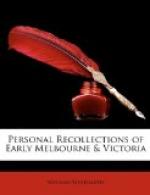Wilson was not much of a man of practical business. He was not successful in his early life at home, where business is a harder ordeal, and with fewer of the “flukes” that cross the path in young colonies. Arriving in Melbourne shortly after myself, and in company with a friend, one of the brothers Kilburn, he squatted upon a small cattle run to the south-east, towards Dandenong. But as this did little beyond merely keeping soul and body together, as things were all now subsiding from the riot of the earlier years, it was given up. Foregathering next with Mr. J.S. Johnston, they between them bought “The Argus” from Kerr for a very small sum—I think under 300 pounds—and the paper then started upon its successful career under the increased vigour and improved method of its management.
Although, as I have said, not a business man himself, Wilson was fortunate in business partners—first Mr. Johnston, as above said, succeeded by my old friend James Gill, who, retiring, was replaced by Lauchlan Mackinnon whose energy and application piloted the paper financially into its later grand position. He had latterly, besides, a surpassing business agent in my old friend James Rae, whose firm of Jackson, Rae and Co. had retired comparatively early, after attaining the mercantile headship of the colony; thus leaving the colonial field open to other early friends, Fred. G. Dalgety and Fred. A. Du Croz, who have since, as Dalgety, Du Croz and Co., and Dalgety and Co. Limited, taken the first position in Australasian commerce.
For some years Wilson took full charge of the editorial and general literary work, which, after the gold discoveries, was labour second to none. In the sudden expansion of all colonial interests, there was constant fear for years together of falling short of adequate supply. Now it was type, again it would be paper, and, worst of all, it would at times be the inadequacy of staff. The Australian press had at times to be content with such dress of paper as could on emergency be had, and for some time, as I recollect, one of the Sydney issues came out on tea paper from China. Wilson, as I have repeatedly seen him, would occupy his corner in the comparatively large room into which the narrow old premises in Collins-street east had been latterly expanded. There most of the work was done, he receiving, during nearly the whole night, news and messages, correcting proofs, and passing instructions in his quiet off-hand, and, when needful, peremptory or commanding way, and, amidst the ceaseless noise, writing or correcting leaders when possible.




